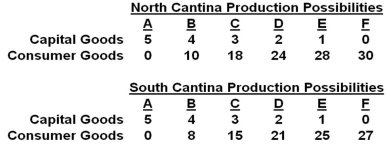Exam 1: Limits, Alternatives, and Choices
Exam 1: Limits, Alternatives, and Choices210 Questions
Exam 2: The Market System and the Circular Flow109 Questions
Exam 3: Demand, Supply, and Market Equilibrium180 Questions
Exam 4: Market Failures: Public Goods and Externalities97 Questions
Exam 5: Governments Role and Government Failure126 Questions
Exam 6: Elasticity134 Questions
Exam 7: Utility Maximization106 Questions
Exam 8: Behavioral Economics153 Questions
Exam 9: Businesses and the Cost of Production159 Questions
Exam 10: Pure Competition in the Short Run115 Questions
Exam 11: Pure Competition in the Long Run69 Questions
Exam 12: Pure Monopoly119 Questions
Exam 13: Monopolistic Competition and Oligopoly192 Questions
Exam 14: Technology RD and Efficiency106 Questions
Exam 15: The Demand for Resources137 Questions
Exam 16: Wage Determination189 Questions
Exam 17: Rent Interest and Profit93 Questions
Exam 18: Natural Resource and Energy Economics165 Questions
Exam 19: Public Finance: Expenditures and Taxes128 Questions
Exam 20: Antitrust Policy and Regulation113 Questions
Exam 21: Agriculture: Economics and Policy85 Questions
Select questions type
(Last Word)The fallacy of composition is essentially the error of:
(Multiple Choice)
4.9/5  (36)
(36)
In drawing a particular budget line,money income and the prices of the two products are fixed.
(True/False)
4.7/5  (39)
(39)
If someone produced too much of a good,this would suggest that:
(Multiple Choice)
4.8/5  (42)
(42)
Answer the question on the basis of the data given in the following production possibilities table:
Capital Goods 5 4 3 2 1 0 onsumer Goods 0 5 9 12 14 15 Refer to the table.For these data,the law of increasing opportunity costs is reflected in the fact that:
(Multiple Choice)
4.8/5  (31)
(31)
Kelly works at an ice cream shop and observes that the number of people buying ice cream varies greatly from day to day.For a couple of weeks she has recorded the number of people at the shop each day,as well as the daily temperature.If Kelly is using the scientific method to better understand ice cream buying habits,her next step is to:
(Multiple Choice)
4.9/5  (42)
(42)
Marginal analysis means that decision makers compare the extra benefits with the extra costs of a specific choice.
(True/False)
4.7/5  (33)
(33)
Brinley says that "gas prices are rising because there aren't enough oil refineries." Katie argues that "gas prices are rising because of the growing demand for gasoline from China and India." We can conclude that:
(Multiple Choice)
4.7/5  (42)
(42)
Answer the question on the basis of the following information.Assume that if the interest rate that businesses must pay to borrow funds were 20 percent,it would be unprofitable for businesses to invest in new machinery and equipment,so investment would be zero.But if the interest rate were 16 percent,businesses would find it profitable to invest $10 billion.If the interest rate were 12 percent,$20 billion would be invested.Assume that total investment continues to increase by $10 billion for each successive 4 percentage point decline in the interest rate. Refer to the information.Which of the following is an accurate verbal statement of the described relationship?
(Multiple Choice)
5.0/5  (43)
(43)
Which of the following will not produce an outward shift of the production possibilities curve?
(Multiple Choice)
4.8/5  (36)
(36)
Answer the question on the basis of the following production possibilities tables for two countries,North Cantina and South Cantina:  Refer to the tables.If South Cantina is producing at production alternative D,the opportunity cost of the third unit of capital goods will be:
Refer to the tables.If South Cantina is producing at production alternative D,the opportunity cost of the third unit of capital goods will be:
(Multiple Choice)
4.8/5  (43)
(43)
Which of the following statements,if any,is correct for a nation that is producing only consumer and capital goods?
(Multiple Choice)
4.8/5  (33)
(33)
(Consider This)The economic perspective used in customer decision making at fast-food restaurants is reflected in:
(Multiple Choice)
4.8/5  (24)
(24)
Macroeconomics explains the behavior of individual households and business firms;microeconomics is concerned with the behavior of aggregates or the economy as a whole.
(True/False)
4.8/5  (47)
(47)
Which of the following do economists consider to be capital?
(Multiple Choice)
4.9/5  (39)
(39)
Showing 181 - 200 of 210
Filters
- Essay(0)
- Multiple Choice(0)
- Short Answer(0)
- True False(0)
- Matching(0)